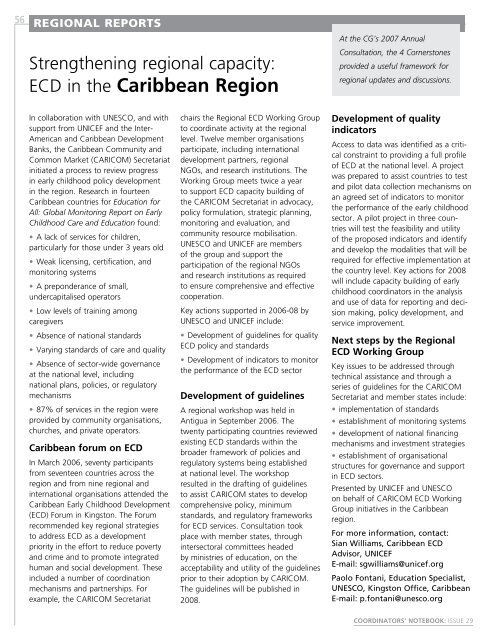A global call to action for early childhood
A global call to action for early childhood
A global call to action for early childhood
Create successful ePaper yourself
Turn your PDF publications into a flip-book with our unique Google optimized e-Paper software.
56<br />
REGIONAL REPORTS<br />
Strengthening regional capacity:<br />
ECD in the Caribbean Region<br />
At the CG’s 2007 Annual<br />
Consultation, the 4 Corners<strong>to</strong>nes<br />
provided a useful framework <strong>for</strong><br />
regional updates and discussions.<br />
In collaboration with UNESCO, and with<br />
support from UNICEF and the Inter-<br />
American and Caribbean Development<br />
Banks, the Caribbean Community and<br />
Common Market (CARICOM) Secretariat<br />
initiated a process <strong>to</strong> review progress<br />
in <strong>early</strong> <strong>childhood</strong> policy development<br />
in the region. Research in fourteen<br />
Caribbean countries <strong>for</strong> Education <strong>for</strong><br />
All: Global Moni<strong>to</strong>ring Report on Early<br />
Childhood Care and Education found:<br />
• A lack of services <strong>for</strong> children,<br />
particularly <strong>for</strong> those under 3 years old<br />
• Weak licensing, certification, and<br />
moni<strong>to</strong>ring systems<br />
• A preponderance of small,<br />
undercapitalised opera<strong>to</strong>rs<br />
• Low levels of training among<br />
caregivers<br />
• Absence of national standards<br />
• Varying standards of care and quality<br />
• Absence of sec<strong>to</strong>r-wide governance<br />
at the national level, including<br />
national plans, policies, or regula<strong>to</strong>ry<br />
mechanisms<br />
• 87% of services in the region were<br />
provided by community organisations,<br />
churches, and private opera<strong>to</strong>rs.<br />
Caribbean <strong>for</strong>um on ECD<br />
In March 2006, seventy participants<br />
from seventeen countries across the<br />
region and from nine regional and<br />
international organisations attended the<br />
Caribbean Early Childhood Development<br />
(ECD) Forum in Kings<strong>to</strong>n. The Forum<br />
recommended key regional strategies<br />
<strong>to</strong> address ECD as a development<br />
priority in the ef<strong>for</strong>t <strong>to</strong> reduce poverty<br />
and crime and <strong>to</strong> promote integrated<br />
human and social development. These<br />
included a number of coordination<br />
mechanisms and partnerships. For<br />
example, the CARICOM Secretariat<br />
chairs the Regional ECD Working Group<br />
<strong>to</strong> coordinate activity at the regional<br />
level. Twelve member organisations<br />
participate, including international<br />
development partners, regional<br />
NGOs, and research institutions. The<br />
Working Group meets twice a year<br />
<strong>to</strong> support ECD capacity building of<br />
the CARICOM Secretariat in advocacy,<br />
policy <strong>for</strong>mulation, strategic planning,<br />
moni<strong>to</strong>ring and evaluation, and<br />
community resource mobilisation.<br />
UNESCO and UNICEF are members<br />
of the group and support the<br />
participation of the regional NGOs<br />
and research institutions as required<br />
<strong>to</strong> ensure comprehensive and effective<br />
cooperation.<br />
Key <strong>action</strong>s supported in 2006-08 by<br />
UNESCO and UNICEF include:<br />
• Development of guidelines <strong>for</strong> quality<br />
ECD policy and standards<br />
• Development of indica<strong>to</strong>rs <strong>to</strong> moni<strong>to</strong>r<br />
the per<strong>for</strong>mance of the ECD sec<strong>to</strong>r<br />
Development of guidelines<br />
A regional workshop was held in<br />
Antigua in September 2006. The<br />
twenty participating countries reviewed<br />
existing ECD standards within the<br />
broader framework of policies and<br />
regula<strong>to</strong>ry systems being established<br />
at national level. The workshop<br />
resulted in the drafting of guidelines<br />
<strong>to</strong> assist CARICOM states <strong>to</strong> develop<br />
comprehensive policy, minimum<br />
standards, and regula<strong>to</strong>ry frameworks<br />
<strong>for</strong> ECD services. Consultation <strong>to</strong>ok<br />
place with member states, through<br />
intersec<strong>to</strong>ral committees headed<br />
by ministries of education, on the<br />
acceptability and utility of the guidelines<br />
prior <strong>to</strong> their adoption by CARICOM.<br />
The guidelines will be published in<br />
2008.<br />
Development of quality<br />
indica<strong>to</strong>rs<br />
Access <strong>to</strong> data was identified as a critical<br />
constraint <strong>to</strong> providing a full profile<br />
of ECD at the national level. A project<br />
was prepared <strong>to</strong> assist countries <strong>to</strong> test<br />
and pilot data collection mechanisms on<br />
an agreed set of indica<strong>to</strong>rs <strong>to</strong> moni<strong>to</strong>r<br />
the per<strong>for</strong>mance of the <strong>early</strong> <strong>childhood</strong><br />
sec<strong>to</strong>r. A pilot project in three countries<br />
will test the feasibility and utility<br />
of the proposed indica<strong>to</strong>rs and identify<br />
and develop the modalities that will be<br />
required <strong>for</strong> effective implementation at<br />
the country level. Key <strong>action</strong>s <strong>for</strong> 2008<br />
will include capacity building of <strong>early</strong><br />
<strong>childhood</strong> coordina<strong>to</strong>rs in the analysis<br />
and use of data <strong>for</strong> reporting and decision<br />
making, policy development, and<br />
service improvement.<br />
Next steps by the Regional<br />
ECD Working Group<br />
Key issues <strong>to</strong> be addressed through<br />
technical assistance and through a<br />
series of guidelines <strong>for</strong> the CARICOM<br />
Secretariat and member states include:<br />
• implementation of standards<br />
• establishment of moni<strong>to</strong>ring systems<br />
• development of national financing<br />
mechanisms and investment strategies<br />
• establishment of organisational<br />
structures <strong>for</strong> governance and support<br />
in ECD sec<strong>to</strong>rs.<br />
Presented by UNICEF and UNESCO<br />
on behalf of CARICOM ECD Working<br />
Group initiatives in the Caribbean<br />
region.<br />
For more in<strong>for</strong>mation, contact:<br />
Sian Williams, Caribbean ECD<br />
Advisor, UNICEF<br />
E-mail: sgwilliams@unicef.org<br />
Paolo Fontani, Education Specialist,<br />
UNESCO, Kings<strong>to</strong>n Office, Caribbean<br />
E-mail: p.fontani@unesco.org<br />
COORDINATORS’ NOTEBOOK: ISSUE 29
















